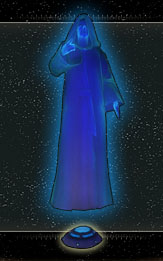m (Reverted edits by 77.102.126.186 (talk | block) to last version by Cavalier One) |
|||
| (3 intermediate revisions by one other user not shown) | |||
| Line 6: | Line 6: | ||
==History== |
==History== |
||
===Rise of the Empire=== |
===Rise of the Empire=== |
||
| − | {{dialogue|Amidala|Do you think he will dismantle the Senate |
+ | {{dialogue|Amidala|Do you think he will dismantle the Senate?|Mothma|Why bother? As a practical matter, the Senate no longer exists.|Danu|The constitution is in shreds...amendment after amendment...|attr=Senators Padmé Amidala, Mon Mothma, and Giddean Danu discussing Palpatine's rise to power|src=Star Wars: Episode III Revenge of the Sith}} |
[[File:Sithdelscener1pic2.jpg|right|250px|thumb|Bail Organa informs other senators that Palpatine has declared a new system of regional Governors]] |
[[File:Sithdelscener1pic2.jpg|right|250px|thumb|Bail Organa informs other senators that Palpatine has declared a new system of regional Governors]] |
||
Revision as of 16:16, 19 December 2014
| | |

Interior of the Imperial Senate.
- "I'm a member of the Imperial Senate on a diplomatic mission to Alderaan!"
- ―Princess Leia
The Imperial Senate or Imperial Congress was the de jure legislative body of the Galactic Empire, though in fact it held little real authority. Instead, it served mainly as an advisory body to Emperor Palpatine. The Imperial Senate was the successor to the Galactic Senate of the Republic, which was reformed when the then Supreme Chancellor Palpatine declared himself sole ruler.
History
Rise of the Empire
- Amidala: "Do you think he will dismantle the Senate?"
- Mothma: "Why bother? As a practical matter, the Senate no longer exists."
- Danu: "The constitution is in shreds...amendment after amendment..."
- ―Senators Padmé Amidala, Mon Mothma, and Giddean Danu discussing Palpatine's rise to power[src]

Bail Organa informs other senators that Palpatine has declared a new system of regional Governors
The Imperial Senate was established in 19 BBY after the Empire was founded by the self-appointed Emperor Palpatine, transforming the old Galactic Senate. Rather than risk directly seizing power and overthrowing the Senate, Palpatine subtly manipulated the Galactic Senate into voting incrementally more and more emergency powers to the Chancellorship during the Clone Wars. By the end of the conflict, Palpatine had gained near-dictatorial powers. The final stroke came following the death of Separatist leader Count Dooku during the closing days of the war, when Palpatine issued a decree creating a new class of Planetary Governors and Sector Moffs appointed directly by the Chancellorship, to oversee all star systems in the Republic. A minority of Senators protested this action, but Palpatine brushed their complaints aside.

Palpatine declares the formation of the Galactic Empire to the now-Imperial Senate
Within a few days, the Clone Wars ended with the death of General Grievous in a duel with Jedi Master Obi-Wan Kenobi and the execution of the Separatist Council at the hands of Darth Vader. With the justification of a Jedi rebellion, Palpatine ordered Republic troops to wipe out the Jedi Order, and in a speech before the Senate, proclaimed himself Emperor. Senators who vocally resisted were intimidated into silence through brief imprisonment.
On the whole, however, the transition from Galactic Senate to Imperial Senate went quietly and without major incident. Emperor Palpatine did not want to risk tarnishing his public support by making an open grab for power, so he allowed the organization to continue to nominally exist, though it had been gutted of any real functional power. Under advice from Padmé Amidala shortly before her death, Senators Organa and Mon Mothma, along with other Senators from the Delegation of 2000, did not directly confront Palpatine's declaration of a Galactic Empire. Realizing they had already lost, and that further resistance would only be seized upon by Palpatine as justification for dismantling what little remained of the Senate, they determined that their best remaining option was to bide their time in silence.
Although at the time of the Empire's formation a majority of senators were loyal to Palpatine, the Imperial Senate was still a prime (if often clandestine) source of resistance to Palpatine's authority, and despite its changes, came to be known as the "last remnants of the Old Republic." Certain Senators—many of whom later joined the Rebellion—were known for using the Senate as a platform to voice proposals attempting to moderate Palpatine's rule, although always under the guise of perfect loyalty. Prior to its dissolution, the Imperial Senate, under the approval of the Emperor, also issued Intergalactic Passports to anyone in the galaxy to give them expressed permission to travel through the six primary galaxies.[1]
Dissolution
- "The Imperial Senate will no longer be of any concern to us. I've just received word that the Emperor has dissolved the council permanently. The last remnants of the Old Republic have been swept away."
- ―Wilhuff Tarkin

Hologram of Emperor Palpatine, taken from the speech in which he announced the disbanding of the Senate
In 0 BBY (35:3:5), Palpatine ordered the Imperial Senate to be shut down "for the duration of the emergency," ostensibly due to the widespread dissemination of the Declaration of Rebellion over the previous months. It was never revived. To fill the open void in the Imperial government, COMPNOR's Select Committee stepped up to the role of overseeing the vast Imperial bureaucracy and the Imperial Ruling Council became the central leadership within the Empire, while the Moffs and Grand Moffs retained direct control over their territories.
Eventually the succession of the Imperial legislature was filled by various councils, most composed of Moffs: the Central Committee of Grand Moffs, the Imperial Ruling Council, and finally, the Council of Moffs.
According to the Bureau of Operations of Imperial Intelligence, the Rebel Alliance managed to rescue many former Senators who were willing to use their political influence to oppose the Empire. To prevent these politicians from openly supporting the Rebellion, Imperial Intelligence sent teams to attack the Senators' hideouts.[2]
7 ABY marked the year that the Imperial Senate was succeeded by the New Republic Senate.
Powers
Discontented Imperial Senators form the Rebel Alliance
Besides the name, the organization differed somewhat from its Republican forebear. Whereas the Galactic Senate had held both legislative and executive power, the Imperial Senate held only legislative power—though most of this power was in the hands of the Emperor, as he was the overall ultimate authority. Despite such, the Imperial Senate still held limited judicial authority, enough to try high ranking officials in the Empire and, possibly, handle cases tied into the Supreme Court. The Emperor allowed the Senate to provide him counsel in enacting new laws. It also had nominal oversight of the Imperial bureaucracy and worked on the Imperial budget. However, the Emperor made it clear that his judgments would be final: Imperial decrees would be issued without debates, court proceedings, or Senatorial overrides. The Emperor could also call and dismiss the Senate at will. The Senate could also pass amendments to the Imperial Charter and apparently had at least nominal oversight of the Imperial Military.
The day-to-day head of the Senate was no longer the Vice Chair, but the Grand Vizier as President of the Senate. The Senate was, at least in theory, responsible for choosing a new Emperor upon the death or abdication of the current holder of the throne. As Palpatine had no intention of ever dying or abdicating, this power was merely a formality.
Composition
The Imperial Senate was made up of groups of congressmen: Senators and representatives, representing sectors in the Empire. Some were elected directly, while others were appointed by a planet's ruler.
Because of "Human High Culture," most of the alien Senators were replaced by Humans, who ended up representing worlds that were entirely non-human. However, alien senators were not unheard-of, especially in the early days of the Empire.
Committees and Subcommittees include:
- Delegation of 2000
- Senate Budgetary Committee
- Imperial Military Oversight Commission
- Finance Committee
Documents
Documents relating to the Imperial Senate included:
- Capital Powers Act
- Decree 77-92465-001
- Emergency Military Powers Act
- Imperial Charter
- Senate Constitution
Behind the scenes
Palpatine's transformation of the Galactic Senate into the Imperial Senate mirrors how the Roman Republic was transformed into the Roman Empire by its first emperor, Augustus. Rather than risk further confrontation with the Roman Republic's Senate, Augustus allowed the Senators to continue meeting, but they had been stripped of any real executive power, continuing as little more than an advisory council which he could simply ignore at his leisure.
Appearances
Non-canon appearances
- "The Princess Leia Diaries" — Star Wars Tales 11 (Mentioned only)
- Star Wars Infinities: A New Hope
- "The Rebel Club" — Star Wars Tales 19
Sources
- Intergalactic Passport
- Star Wars: The Roleplaying Game, First Edition
- The Star Wars Sourcebook
- Imperial Sourcebook
- Galaxy Guide 5: Return of the Jedi
- Star Wars Sourcebook, Second Edition
 "Galaxywide NewsNets" — Star Wars Adventure Journal 3
"Galaxywide NewsNets" — Star Wars Adventure Journal 3- Shadows of the Empire Sourcebook
- Star Wars Encyclopedia
 Star Wars Customizable Card Game — [[Unknown set: No set defined!]]
Star Wars Customizable Card Game — [[Unknown set: No set defined!]]- Star Wars: Rebellion: Prima's Official Strategy Guide
- Hero's Guide
 "Behind the Threat: The Sith, Part 1: Portrayal" (original article link) on Wizards.com (content now obsolete; backup link)
"Behind the Threat: The Sith, Part 1: Portrayal" (original article link) on Wizards.com (content now obsolete; backup link)- The Force Unleashed Campaign Guide
 "Beheboth: Blood and Water" (original article link) on Wizards.com (content now obsolete; backup link)
"Beheboth: Blood and Water" (original article link) on Wizards.com (content now obsolete; backup link)- Fate of the Jedi: Dramatis Personae
- Rebellion Era Campaign Guide
 Rebel Alliance in the Encyclopedia (content now obsolete; backup link)
Rebel Alliance in the Encyclopedia (content now obsolete; backup link)- The Essential Guide to Warfare
- Star Wars: Edge of the Empire Core Rulebook
 "Space Vegas! The History of the Marvelous Wheel, Part 1 {{{3}}}" — {{{4}}} — [[{{{5}}}|{{{5}}}'s]] StarWars.com Blog (Space Vegas! The History of the Marvelous Wheel, Part 1 backup link (2013/09/26/viva-space-vegas-the-history-of-the-marvelous-wheel-part-1//Viva Space Vegas! The History of the Marvelous Wheel, Part 1) not verified!)
"Space Vegas! The History of the Marvelous Wheel, Part 1 {{{3}}}" — {{{4}}} — [[{{{5}}}|{{{5}}}'s]] StarWars.com Blog (Space Vegas! The History of the Marvelous Wheel, Part 1 backup link (2013/09/26/viva-space-vegas-the-history-of-the-marvelous-wheel-part-1//Viva Space Vegas! The History of the Marvelous Wheel, Part 1) not verified!)
Notes and references
- ↑ Intergalactic Passport
- ↑ Star Wars Galaxies - Imperial terminal mission "Destroy senators' hideout"
